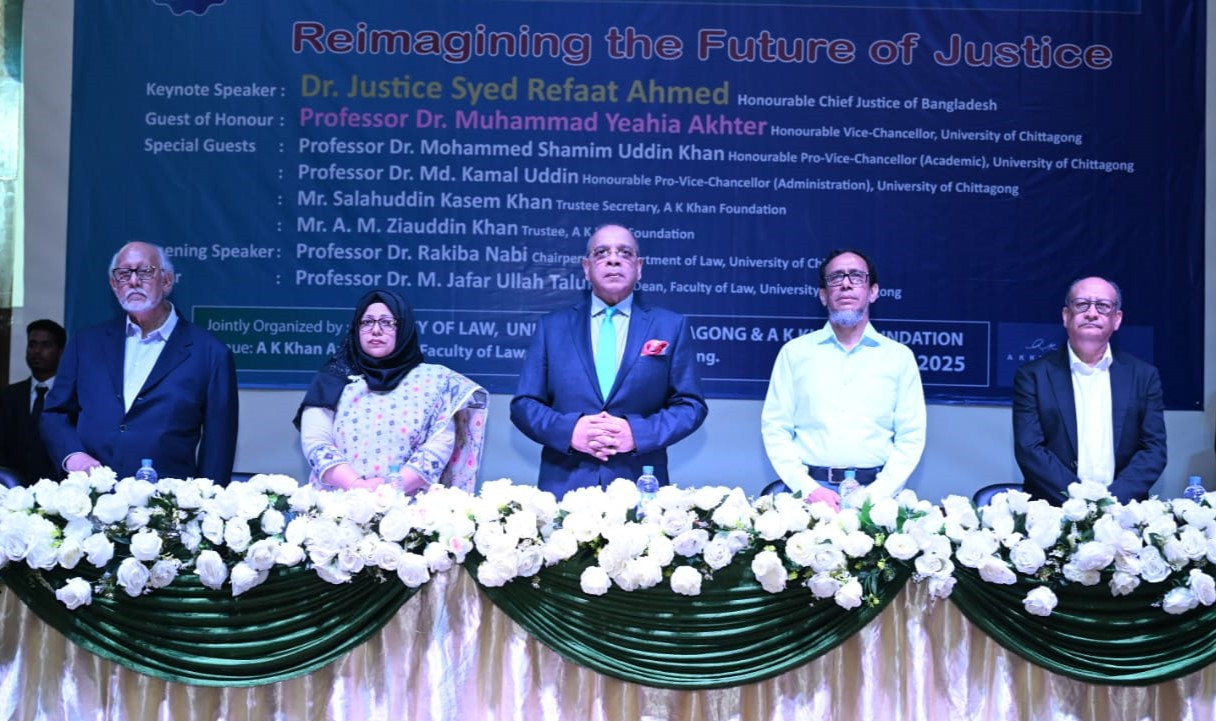Print: 28 Oct 2025
Future of judiciary lies in autonomy and technology: Chief Justice
Two independent constitutional bodies have been established to ensure the transparent appointment and removal of judges, he says
Chief Justice of Bangladesh Dr. Syed Refaat Ahmed on Sunday said that judicial reforms are being guided by three key pillars—judicial independence, administrative autonomy, and procedural efficiency.
He said two independent constitutional bodies—the Supreme Judicial Appointment Council and the Supreme Judicial Council—have been established to ensure transparent appointment and removal of judges.
He made the remarks while delivering the keynote speech at the “7th A.K. Khan Memorial Law Lecture 2025” titled "Remaining the Future of Justice", at the University of Chittagong.
The Faculty of Law at the University of Chittagong and A.K. Khan Foundation jointly organised the event.
The Chief Justice said a separate judicial secretariat under the Supreme Court is in the final stages of formation to ensure full administrative autonomy.
He added that a comprehensive policy on judge transfers has already been submitted to the government to ensure fairness and transparency.
Highlighting his reform initiatives, the Chief Justice noted the introduction of digital systems like a case tracking dashboard, requisition portal, help-line services, and a paperless company bench. He also announced plans to establish specialised courts, including commercial, child, and power-related tribunals. He said the European Union has shown strong interest in supporting these reforms.
He warned that the rise of cybercrime and virtual offences demands a new legal approach that balances freedom of expression with digital safety.
“Technology is not a barrier but a catalyst for innovation,” he said, citing AI and nanotech-driven forensic science as examples.
The Chief Justice emphasised that without an independent judiciary, no reform effort can be sustained. “This roadmap is part of a broader constitutional renaissance,” he said, adding that Bangladesh’s judiciary is now the only fully functional constitutional institution.
On Saturday evening, he also held a special meeting at the Circuit House with judicial officers from various courts in Chattogram.
The seminar was chaired by Professor Dr. M Zafrullah Talukder, Dean of the Faculty of Law. Chittagong University Vice-Chancellor Professor Dr. Yahya Akhtar attended as a special guest.
More From Bangladesh
More From Bangladesh
Future of judiciary lies in autonomy and technology: Chief Justice
Two independent constitutional bodies have been established to ensure the transparent appointment and removal of judges, he says

Chief Justice of Bangladesh Dr. Syed Refaat Ahmed on Sunday said that judicial reforms are being guided by three key pillars—judicial independence, administrative autonomy, and procedural efficiency.
He said two independent constitutional bodies—the Supreme Judicial Appointment Council and the Supreme Judicial Council—have been established to ensure transparent appointment and removal of judges.
He made the remarks while delivering the keynote speech at the “7th A.K. Khan Memorial Law Lecture 2025” titled "Remaining the Future of Justice", at the University of Chittagong.
The Faculty of Law at the University of Chittagong and A.K. Khan Foundation jointly organised the event.
The Chief Justice said a separate judicial secretariat under the Supreme Court is in the final stages of formation to ensure full administrative autonomy.
He added that a comprehensive policy on judge transfers has already been submitted to the government to ensure fairness and transparency.
Highlighting his reform initiatives, the Chief Justice noted the introduction of digital systems like a case tracking dashboard, requisition portal, help-line services, and a paperless company bench. He also announced plans to establish specialised courts, including commercial, child, and power-related tribunals. He said the European Union has shown strong interest in supporting these reforms.
He warned that the rise of cybercrime and virtual offences demands a new legal approach that balances freedom of expression with digital safety.
“Technology is not a barrier but a catalyst for innovation,” he said, citing AI and nanotech-driven forensic science as examples.
The Chief Justice emphasised that without an independent judiciary, no reform effort can be sustained. “This roadmap is part of a broader constitutional renaissance,” he said, adding that Bangladesh’s judiciary is now the only fully functional constitutional institution.
On Saturday evening, he also held a special meeting at the Circuit House with judicial officers from various courts in Chattogram.
The seminar was chaired by Professor Dr. M Zafrullah Talukder, Dean of the Faculty of Law. Chittagong University Vice-Chancellor Professor Dr. Yahya Akhtar attended as a special guest.





